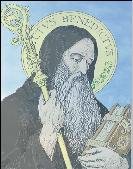Medjugorje:
Condemned by the Church
"But even if we or an angel from heaven should preach a gospel to you other than that which we have preached to you, let him be anathema!" (Gal. 1:9)
The past few decades have witnessed a proliferation of supposed apparitions of Our Lady. These claims of supernatural events have captured the interest of very many Catholics and have been the source of innumerable pilgrimages. Because of the deceitful artifices of the Evil One, who has so much influence today, it is extremely essential for the faithful to be wary of all such claims and to use the clear guides that the Church has given us to discern if events such as those ocurring at Garabandel, Conyers, Bayside, and so on are from God or not. These guides are two: alignment of the apparitions with Church doctrine and the approbation of the Church. If either of these two principles is negated, we are committing a serious error if we give credence to the apparition, for this is a crystal clear sign that it is false and therefore from the Devil.
It is the purpose of this paper to show that, using these two guides, it is certain that the most popular of the recent averred Marian appearances, those at Medjugorje, are in every respect false and repudiated by the Church.
Medjugorje: Condemned by the Hierarchy
It is the duty of the local bishop of the diocese in which supposed supernatural events take place to study and confirm or deny the legitimacy of the claims being made. The bishop in the diocese to which Medjugorje belongs, Msgr. Zanic of Mostar, remitted this duty by forming a diocesan commission to do an impartial inquiry into the events that had been taking place since 1981. After a few years of thorough and intense investigative study, which the Church always exercises to determine an unmistakable decision in these matters, the Bishop issued a statement in 1986 giving the results of the study. In the statement, Msgr. Zanic condemned the apparitions as not made by the most Holy Virgin Mary and he forbade the pilgrimages set up from the beginning without ecclesiastical approval by the pastor of Mostar.
1) The second Diocesan Commission, which worked from 1984 to 1986, voted explicitly on 2 May 1986, by an overwhilming majority for the Non constate de supernaturalitate (11 negative votes, 2 positive, 1 in nucleo, 1 in abstention). 2) The declaration of the Episcopal Conference of 1991 stated: "On the basis of studies conducted so far, it cannot be affirmed that supernatural apparitions and revelations are occurring." ...My conviction and my position is not only Non constat de supernaturalitate, but also Constat de non supernaturalitate as regards the apparitions or revelations of Medjugorje. --Msgr. Ratko Peric, Bishop of Mostar, Letter of October 2, 1997, to M. Thierry Boutet, Editor of the journal Edifa.
In a resulting interview given by Fr. Deleclos of the Libre Belgique, Msgr. Zanic was asked: "Are you, as a matter of principle, against apparitions?" The Bishop replied: "Quite the contrary! I myself have been eight times to Lourdes and I have organized pilgrimages. I have done much for the devotion to the Most Holy Virgin. I was even in Banneux, in Beauraign (Belgium), and Syracuse (Italy), three places where the apparitions of Mary had been stated as authentic."
"However, you are not convinced of this in Medjugorje?" Reply: "I should really be glad to have a Lourdes in my diocese. It would be something grandiose. But I cannot before God, before my conscience and before the Church proclaim these apparitions are authentic and supernatural. I am certainly a sinner and unworthy to be a bishop, yet I believe it would be the worst of all the sins of my life to let this falseness pass for truth, knowing that it is a lie." Despite these words of the Bishop, which the faithful should accept as a decision from God, people continued to flock to Medjugorje and the priest did not desist from organizing pilgrimages as ordered.
Another committee on the national level, composed of 20 bishops, was organized to decide on the "apparitions". This committee also spent several years in patiently studying the matter and finally in November 1990 issued a statement which concluded that there is no proof that Marian apparitions have occurred at Medjugorje. This statement was approved nearly unanimously, with 19 bishops in favor and one abstaining. A Vatican doctrinal official said the bishops' statement against defining the apparitions as supernatural should be accepted by the faithful around the world.
Regardless of these testimonies by the most competent authorities in the Church, many refuse to heed the Church's decision and persist in going to Medjugorje. One wonders what authority would be sufficient to convince these travelers of the truth of the Church's clear and emphatic declaration. It is also disturbing to consider that, if the "apparitions" are not from God, from whence do they originate?
Medjugorje: Condemned by Tradition
In her autobiography, Saint Teresa writes, "I only regard a revelation as true if it is in no way contrary to Holy Scripture and to the laws of the Church, which we are obliged to follow." The soul favored with extraordinary graces "feels capable of confounding all the demons in order to uphold the smallest of the truths taught by the Church!" If a revelation "departed ever so little from Holy Scripture, I would see in it a snare of the Devil... in such a case, it is not necessary to look for any other signs nor even to examine what manner of spirit it is. This mark alone so clearly unveils the wiles of the evil spirit that, were all the world to assure me that it is the spirit of God, I still would not believe it."
http://www.geocities.com/Athens/Rhodes/ ... resies.htm
medjugorje condemned by Church
- KevinSymonds
- Posts: 887
- Joined: Thu Jul 06, 2006 8:38 am
